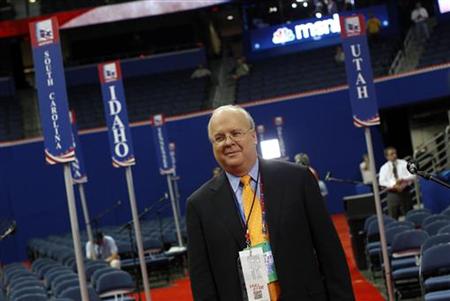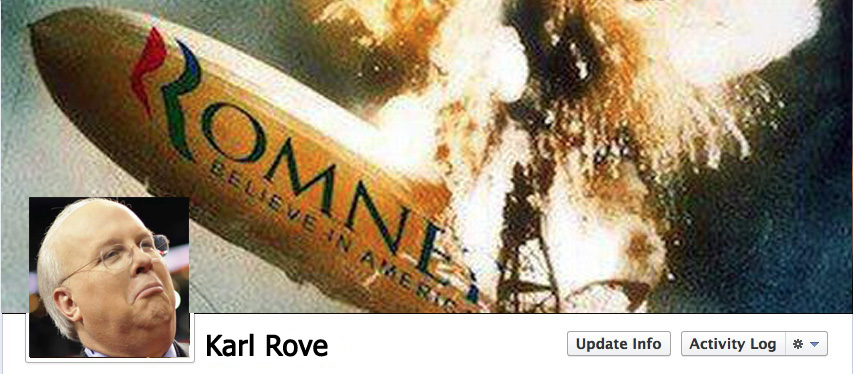
"I think this is premature," said Rove, a former senior adviser to the shrub and architect of the shrub's successful theft the White House.
"We know that Karl has a rooting interest," Faux host Chris Wallace replied.
More than a rooting interest: Rove was the most prolific fundraiser for repugican causes during the 2012 election cycle.
With the assistance
of a few powerful repugican friends, Rove helped to secure an
estimated $300 million for repugican candidates, hoping to help turn the White House over to Romney and control of the U.S. Senate to repugicans.
In a $6 billion
campaign, Rove's ability to part wealthy repugicans from their money
made the political operative - who co-founded the American Crossroads "Super PAC" - a force in the party's effort to take down Obama.
Democratic groups raised millions of dollars based on
appeals that focused on the threat Rove and the Crossroads groups posed
to Democrats.
As it turned out, Obama held the White House and in nine of the 10 Senate races where Rove's groups spent the most money, the Democratic candidate won.
On Wednesday, repugicans' discontent was evident.
Conservative
activist Richard Viguerie said in a statement Wednesday that "in any
logical universe," Rove "would never be hired to run or consult on a
national campaign again and no one would give a dime to their
ineffective Super PACs, such as American Crossroads."
According to the Center for Responsive Politics, Rove's
group spent more than $1 million in 10 different Senate races.
At the top of that group, Crossroads
spent $11.2 million opposing Senate candidate Tim Kaine in Virginia, $7
million opposing Representative Shelley Berkley in Nevada, and $6
million in both Ohio and Wisconsin, opposing Senator Sherrod Brown and
Tammy Baldwin, a member of the House of Representatives who was elected
to the U.S. Senate.
Only Berkley lost on Tuesday.For months, Rove's commercials told Montanans that their U.S. senator, Jon Tester, was "a top recipient of campaign cash from lobbyists and big banks."
Missourians were instructed to tell their Democratic senator, Claire McCaskill, "to stop spending and cut the debt."
In those races, as in Florida and Indiana, Rove's candidate lost. Only in Nevada, where Senator Dean Heller was challenged by Berkley, did Rove assist with a victory in race where he invested more than $1 million.
According to
calculations made by the Sunlight Foundation, a nonpartisan group that
seeks more transparency in campaign finance, Rove's outfits provided
dismal returns to investors.
By the group's measure, 1 percent of the more than $100 million spent by American Crossroads
achieved its desired results. Thirteen percent of the more than $70
million spent by Crossroads GPS did the same, the Sunlight Foundation
said.
With Obama
retaining the White House and the Democrats winning many tight Senate
races, other conservative spending groups faltered, just as Rove's did.
Only 5 percent of
the money spent by the U.S. Chamber of Commerce resulted in its desired
effect, as measured by the Sunlight Foundation.
'THIS THING WAS WON'
In an interview
with Reuters earlier this year, Rove said he wanted Crossroads to be a
"permanent presence" in U.S. politics, an organization that would work
alongside the repugican cabal and employ the party's top strategists
while remaining an attractive home for the party's most influential
donors.
In 2007, Rove
resigned as the shrub's deputy chief of staff amid questions about his role
in the firing of a federal prosecutor. With the shrub's legacy bruised even
among his own party, the 2012 campaign provided Rove a shot at
redemption.
Appearing on Fox News on Wednesday morning, Rove sifted for a few gems in the election's rubble.
He said Obama's
margin of victory among young voters decreased in his second election.
He said Obama is the first president to be re-elected with a smaller
share of the vote than in his first election.
Saying that Romney
had convinced voters he was a better leader and had a better vision than
Obama, Rove offered a different spin on Romney's losing campaign.
"This thing," Rove said, "was won."



No comments:
Post a Comment